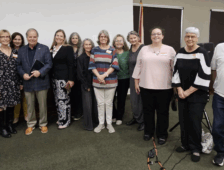By Tyler Pruett, Managing Editor
RAINSVILLE, Ala. — Many citizens may look at the ballot tomorrow, and wonder, “just what are these amendments?”
14 amendments will appear on the ballot statewide, and Amendment One will appear on the DeKalb County ballot only. Some of the amendments address important issues facing our state, while some only affect one county, and one amendment even seeks to do away with county amendments being voted on state wide.
While some issues seem to not affect the average voter, important issues like impeachment, state park funding, right to work, and toll roads and bridges will be decided on this week.
Here is a breakdown of each amendment:
- Amendment 1 (DeKalb County Ballot Only)
- Would repeal Senate Bill 845 for DeKalb County, which requires the county commission to hold a special election for a position vacated with more than a year left in the term. A successful ‘yes’ vote would mean the Governor would appoint someone to fill the open seat and a vote held on the next regular election day.
- Amendment 1 (Statewide)

Amendment One (Statewide) will add two members to the Auburn University Board of Trustees. (wikipedia.org) - This Amendment would add two members to the Auburn University Board of Trustees and prevent no more than three members’ terms from expiring at the same time.
- Amendment 2
- This would prevent the state government from diverting funds from state parks to other programs, which has been done in recent years. A successful ‘yes’ vote would also allow for the privatization of some park services.
- Amendment 3
- Amendment 3 seeks to prevent many of these amendments from appearing on the local ballot. Currently, unless an amendment passes either the legislature or the Local Constitutional Amendment Commission without any dissent, the whole state must vote on Amendments that affect only one county (Examples, see Amendments 7, 9, and 10).
- Amendment 4
- Ensures that counties can’t increase any taxes or fees and would not authorize any policies that, “infringe on a citizen’s right with respect to the use of his or her private property.”
- Amendment 5
- Seeks to replace outdated language in the state constitution on the separation of powers regarding the executive (Governor), legislative (senate and house), and the judicial (Attorney General) branches.
-
 Politicians at the 1875 Alabama Constitutional Convention. Much of the language in our constitution hasn't changed since then. (Wikimedia Commons)
Politicians at the 1875 Alabama Constitutional Convention. Much of the language in our constitution hasn't changed since then. (Wikimedia Commons)
- Amendment 6
- Will replace Article VII of the constitution, concerning impeachment of the elected officials. The new amendment would require a two-thirds vote in the senate to remove an official from office. It would also allow state board of education members and the superintendent to be impeached if needed. Although impeachment is a hot topic in Montgomery this year, this amendment was actually drafted in 2015.
- Amendment 7

Amendment 7, like several others, applies only to one county, in this case, Etowah. If this annoys you, vote "Yes" on Amendment 3. - This applies to Etowah County only. It would place most employees of the Etowah County Sheriff’s Office under control of an internal personnel board. This is in response to a law that will not allow Sheriff’s Office employees to receive a raise unless all county employees receive one.
- Amendment 8
- This amendment would put our state’s “right to work” law officially in the constitution. Officially passed in 1953, the “right to work” law simply states that a person cannot be denied for employment because of membership in a union, or because they refuse to participate in a union. While it sounds simple, our state’s right to work status affects thousands of jobs and industries setting up shop in the state.
- Amendment 9
- This applies only to Pickens County. It will allow the election or appointment of a judge up to the age of 75. Currently, a judge is prevented from running or being appointed after age 70.
- Amendment 10
- Applies only to Calhoun County. Amendment 10 would prevent any city from establishing a planning jurisdiction or a police jurisdiction if the city is not located at least partly within the aforementioned county.
- Amendment 11
- Concerns the Major 21st Century Manufacturing Zone Act. Previously, when cities or counties redeveloped land for manufacturing facilities, they must resell the property at Fair Market Value. Amendment 11 would allow these entities to determine the price.
- Amendment 12
- This would allow the legislature to legalize cities in Baldwin County to build and operate toll roads and bridges. A ‘yes’ victory would not directly build any toll roads or bridges, but would allow these cities to build them if they desire. This would affect tourism and revenue for the gulf region.

- Amendment 13
- Amendment 13 would repeal any existing age limits for public officials in the the state, with the exception of judges (Amendment 9 changes this in Pickens County).
- Amendment 14
- This measure would protect hundreds of local laws already in existence. In a court ruling last year, it was decided that these laws needed, “three fifths of a quorum,” which works out to 32 votes to pass. By current procedures, many local laws passed did not meet his requirement.




 Politicians at the 1875 Alabama Constitutional Convention. Much of the language in our constitution hasn't changed since then. (Wikimedia Commons)
Politicians at the 1875 Alabama Constitutional Convention. Much of the language in our constitution hasn't changed since then. (Wikimedia Commons)



